Commercial Collection
MarBorg offers commercial collection services and equipment with cans, carts, or bins. Cans are available in 32-gallons for backyard service. Carts are available in 35, 65, and 95-gallon sizes. Bins are available in 1.5, 2, 3, and 4-cubic yards. Roll-offs and compactors are available for large-volume trash producers. We will customize your level of service, including your container sizes and number of weekly pickups, to uniquely suit your company’s needs. Service will be provided 1-6 days per week, on a schedule that works for your business.
On your scheduled service day, please ensure that any enclosures are unlocked and that full access is available for our drivers. In some cases, this means that you will need to push your bin out to an accessible location. Please call the office for details regarding your specific location.
We also provide bar and lock mechanisms for our bins to prevent unauthorized use of your container. Please request this feature when you order your bin. (see sizes below)
All containers are color-coded based on the type of material allowed in the bin. Beige containers are for trash, green containers are for greenwaste, and blue containers are for recycling.
Businesses are also eligible to participate in the Foodscraps Composting Program. Please give us a call at (805) 963-1852 for more details.
Commercial Trash Containers
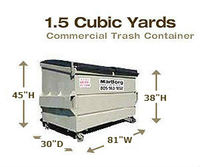
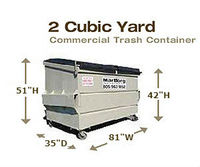
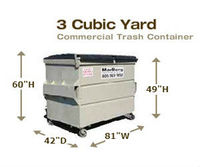
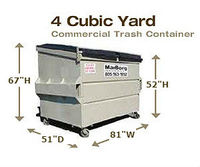
Recycling Law AB 341
Mandatory Commercial Recycling
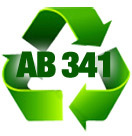 On July 1, 2012 mandatory commercial recycling went into effect with the law known as AB 341 (Assembly Bill 341). This law requires all businesses (including public entities) and multi-family residential dwellings of five units or more to arrange for recycling services. Your business may be subject to additional recycling requirements depending on location and the amount of waste generated. If your business does not currently recycle, now is a great time to start. Call MarBorg today to see how you can divert material from the landfill while reducing your monthly trash bill. For additional details about AB 341, see below.
On July 1, 2012 mandatory commercial recycling went into effect with the law known as AB 341 (Assembly Bill 341). This law requires all businesses (including public entities) and multi-family residential dwellings of five units or more to arrange for recycling services. Your business may be subject to additional recycling requirements depending on location and the amount of waste generated. If your business does not currently recycle, now is a great time to start. Call MarBorg today to see how you can divert material from the landfill while reducing your monthly trash bill. For additional details about AB 341, see below.
Purpose of the Law
To reduce greenhouse gas (GHG) emissions by diverting commercial solid waste to recycling efforts and to expand the opportunity for additional recycling services and recycling manufacturing facilities in California.
Key Roles of the Law
- Business Commercial Recycling Requirements – A business (includes public entities) that generates four cubic yards or more of commercial solid waste per week or is a multifamily residential dwelling of five units or more shall arrange for recycling services. Businesses can take one or any combination of the following in order to reuse, recycling, compost, or otherwise divert solid waste from disposal:
- Self-haul.
- Subscribe to hauler(s).
- Arrange for the pickup of recyclable materials.
- Subscribe to a recycling service that may include mixed waste processing that yields diversion results comparable to source separation.
A property owner of a commercial business or multifamily residential dwelling may require tenants to source separate their recyclable materials to aid in compliance with this section.
Organics Recycling Law AB 1826
Mandatory Commercial Organics Recycling
In 2014, the State of California adopted AB 1826 (Assembly Bill 1826), a mandatory commercial organics recycling law that took effect in 2016. “Organic waste” means food waste, green waste, landscape and pruning waste, nonhazardous wood waste, and food-soiled paper that is mixed in with food waste. As of January 1, 2019, businesses (including public entities) and multi-family residential dwellings of five units or more that generate 4 cubic yards or more of solid waste per week are mandated to recycle their organic waste. To learn more about AB 1826 and how to comply with its requirements, please call MarBorg today.
Purpose of the Law
AB 1826 is phased in over time and targets the largest organic waste generators first, with the long-term goal of keeping organics out of California’s landfills. Organics buried in the landfill release methane gas, which is much more harmful to the environment than carbon dioxide.
Key Roles of the Law
- April 1, 2016: Businesses that generate eight cubic yards of organic waste per week must recycle their organic waste.
- January 1, 2017: Businesses that generate four cubic yards of organic waste per week must recycle their organic waste.
- January 1, 2019: Businesses that generate four cubic yards or more of solid waste per week must recycle their organic waste.
